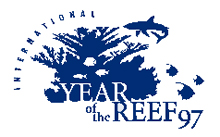An Era of International Environmental Agreements Leads to International Coordination of Coral Reef Conservation
In the last decades of the 20th century, global environmental consciousness began to change. In 1972, the United Nations held the first global environmental summit in Stockholm, Sweden, called the UN Conference on the Human Environment. Here, delegates from around the world declared: “A point has been reached in history when we must shape our actions throughout the world with a more prudent care for their environmental consequences.”
In 1992, governments and organizations from around the world met again in Rio de Janeiro, Brazil, for the UN Conference on the Environment and Development. The delegates in Rio created “Agenda 21,” a global action plan for sustainable development, which addressed the environment and development problems of the day, while preparing the world for future challenges. Chapter 17 of Agenda 21 focused on protection of the world’s oceans, coasts, and the species that live within these waters. Chapter 17 stated that:
“Despite national, subregional, regional and global efforts, current approaches to the management of marine and coastal resources have not always proved capable of achieving sustainable development, and coastal resources and the coastal environment are being rapidly degraded and eroded in many parts of the world.”
The International Coral Reef Initiative
In 1994, the governments of Australia, France, Japan, Jamaica, the Philippines, Sweden, the United Kingdom, and the United States moved to create the International Coral Reef Initiative (ICRI). ICRI was announced in December of 1994 at the First Conference of the Parties to the Convention on Biological Diversity. According to ICRI’s charter, the new initiative was dedicated to addressing Chapter 17 of Agenda 21, and “was founded on the clear recognition that many nations face similar threats to coral reefs and related ecosystems as well as similar management problems.”
The next year, an ICRI workshop was held in the Philippines to develop a global call to action for coral reefs, as well as a framework for action. Governments, non-governmental organizations (NGOs), the research community, donors and funding agencies, the private sector, and development organizations came together for the first time to define international and regional needs and priorities and to spur the development of national coral reef initiatives.
As international awareness grew amongst governments and researchers, a group of scientists began to call for an international public education effort. It was not enough for the research and marine management communities to come together to prevent further loss of coral reefs, they said. As the major reason for coral reef decline was a variety of human pressures, they argued that a global education initiative was needed.
The International Year of the Reef

Logo for International Year of the Reef 1997.
After several years of planning and negotiations, 1997 became the International Year of the Reef, or IYOR. IYOR was designed to raise global awareness about the importance of coral reef ecosystems to the health of the oceans and to human societies and to sound the alarm about their increasing decline. NOAA and other U.S. government and NGO partners were directly involved with planning and implementing IYOR throughout the U.S. and internationally and in supporting regional initiatives in places like the South Pacific and the Caribbean. Ultimately, over 225 organizations in 50 countries participated in IYOR 1997.
Works Consulted
International Coral Reef Initiative. (2006). What is ICRI? Retrieved August 31, 2006 from http://www.icriforum.org/router.cfm?show=secretariat/about_ICRI.html&Item=1.
United Nations. (1972). Declaration of the United Nations Conference on the Human Environment [Electronic version]. Retrieved August 31, 2006 from http://www.unep.org/Documents.multilingual/Default.asp?DocumentID=97&ArticleID=1503.
United Nations. (1992). Report of the United Nations Conference on Environment and Development: Rio Declaration on Environment and Development (Annex 1) [Electronic version]. Retrieved August 31, 2006 from http://www.un.org/documents/ga/conf151/aconf15126-1annex1.htm.
United Nations. (1992). Report of the United Nations Conference on Environment and Development: Agenda 21 [Electronic version]. Retrieved August 31, 2006 from http://www.un.org/esa/sustdev/documents/agenda21/english/agenda21toc.htm.
